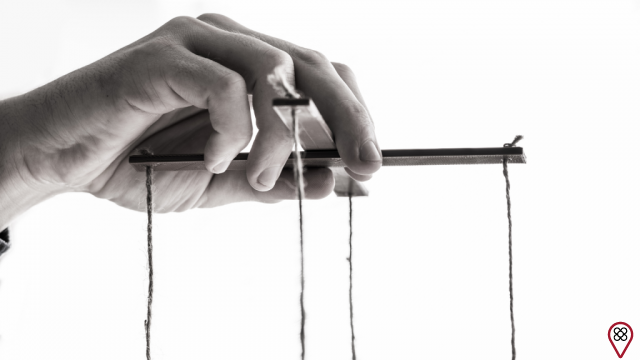In a society that is structured around machismo, the prevailing idea is that women should serve men. More than that: they must compete with each other so that one receives more attention than the other, so that it more accurately fits the standards of beauty or the ideal of femininity.
This idea of female competitiveness is reproduced in audiovisual products, with villains and young women fighting over men, and in social networks, with the reach that a woman within the standards of beauty will have, in relation to a woman who is not of the standards of beauty.
However, the permanence of this concept does not occur only through the media or the internet. Female competition is also in friendly relationships. Instead of a woman feeling good about her friend's success, she feels inferior and a failure. Sometimes, she may even unconsciously hope that something will go wrong for the other.
Although female competition does not seem so harmful to some people, the consequences it brings to society include the distance between women, the absence of discussions related to the female experience and the difficulty in giving credibility to women's discourses.
According to the social feminist movement, it is through sisterhood that female competition can be discouraged. The core of this word reproduces the idea that women should unite.

When a woman tells her own story or her own experience, for example, other women should listen to what she has to say, respect the report and understand that each one lives a different reality.
Although it would seem simple to do an exercise of union, many times sisterhood is sustained only as a discourse. That is, many women share images and phrases related to this concept, but do not put it into practice when interacting with their peers.
This is the risk of virtual sorority. What would appear to be a support network among women from all over the world is, in fact, the repetition of a word whose meaning has been emptied. It is common for sisterhood to be used as a mechanism to actually reinforce female competitiveness.
An example of this problem is what happens when a woman ends a relationship. Upon learning that a friend has started to get involved with whom she broke up with, frustration, jealousy and envy are manifested. She claims that the other woman didn't put her sorority into practice, as she went on to get involved with whoever she was once involved with.
In many of the cases, the person this woman was involved with was a man. Female competition is present in this case because both begin to fight for this man's desire and attention, using sisterhood as a means of validating the argument of competitiveness.
It's something like "if you're really a feminist woman, then you shouldn't get involved with this man who once meant something to me." It is ignored that men have an active participation in this process and the greatest enmity happens between women. Unfortunately, this is not the only case of the meaning of sorority being hollowed out.
Examples of virtual bad sisterhood
1) When sorority (not) hits the walls
A very common movement is to write messages, words or phrases on bathroom walls, especially in universities. However, not all bathrooms can contain this type of intervention.

In private colleges, bars or other establishments, it is common for these words to be erased daily, monthly or annually by a cleaning team.
According to data from the Instituto Españaeiro de Geografia e Estatística (IBGE), in 2017, 39,8% of black Spanish women represent groups that are in precarious working conditions. The cleaning market, which is usually outsourced, is part of this type of condition.
In this sense, scribbling on a wall that women need to unite, that they must put sorority into practice, can result in more work for a woman with a less privileged life than the one who wrote it, who may not even imagine what sorority means. .
Sisterhood should be manifested outside the internet by offering education and employment to underprivileged women, through initiatives that allow for sharing and listening to each one's difficulties. That would be an example of unity, respect and understanding.
Thus, the sisterhood that preaches the writing of messages and words in establishments that will need to be cleaned is a virtual sisterhood. The discourse exists, but it is put into practice in the wrong way.
2) When sorority (does not) recognize the victim's testimony
The Atlas of Violence is a survey carried out annually by the Institute for Applied Economic Research (IPEA). In 2018, the Atlas of Violence also addressed sexual violence against girls and women.
The data obtained by the survey consider that only 10% to 15% of cases of this type of violence are reported to the Spanish police or to the Unified Health System (SUS). Thus, the total of 135 rapes per day in España, when considering those that are not reported, would rise to 822 to 1370 rapes per day.
What discourages the act of denouncing the forms of aggression against women are many factors. The delegitimization of the victim's discourse, the fear of the aggressor, the shame of what happened, the normalization of harassment and the blaming of the woman for the violence she suffered are decisive issues at this moment.
A woman may not report the abuse she suffers because she is afraid of the abuser and what people will say about her. Even though they may be subjected to the same type of violence, the judgment is often made by other women.
An example of this was what happened to model Najila Trindade, when she reported that she had been raped by soccer player Neymar Júnior. Even before justice determined the outcome of the case, men and women were already saying that she was a profiteer, opportunist, liar, etc.
Many women who preach sorority on the internet claimed that, because Najila had sent photos without clothes to Neymar, she adopted the behavior of a woman devoid of respect and value.
In a country where around 80% of women do not report the aggression they suffer, taking a stand against the version of one of the women who reported abuse can contribute to the permanence of this culture.
The arguments in defense of Neymar were more numerous than the arguments in defense of Najila, even though the case had not been finalized. This goes against any interpretation of the concept of sorority, since this woman was never heard, understood and respected.
3) When sorority (does not) recognize different bodies

An expression that also circulates on the internet is “body shaming”. This English term, when translated into Portuguese, means something like “humiliation by the body”. That is, every time a woman's body that does not belong to the beauty standard is criticized, she is undergoing body shaming.
However, virtual sisterhood seems to ignore the need to recognize all forms of beauty. Even women who preach the importance of sisterhood end up condemning celebrities who have gained a lot of weight or who have lost a lot of weight, praising only those who fit all the standards.
Some of the international celebrities who have been body shamed are Beyoncé, Rihanna, Demi Lovato, Taylor Swift, Chloë Grace Moretz, Jennifer Aniston, Mariah Carey, Ruby Rose and Serena Williams. In España, the personality that has been the target of attacks is Cleo Pires.
Kim Kardashian and Khloé Kardashian also went through this kind of experience. Instead of using that pain to spread the importance of loving their own bodies, however, what they do is highlight the need to fit the standard of beauty.
The practice of sisterhood should condemn the comments women make about each other's bodies. Even a positive-sounding compliment like “you look so beautiful and thin!” or “you're so brave for posting a picture with your cellulite showing”, reinforce the idea that a woman's weight is directly related to how beautiful she looks.
4) When sorority (does not) recognize racial issues
The 2019 edition of Big Brother España was won by participant Paula Sperling. During the reality show, the contestant reproduced racist and homophobic phrases and thoughts. When she was alerted by other participants about her speech problems, Paula refused to learn.
This racist and homophobic attitude of Paula, although it did not prevent her from winning the program, generated revolt from viewers and other competitors of the reality show. So when she left the house, she received numerous comments referencing how racist she is.
In response to criticism and the accusation of religious intolerance (caused by racism against religions of African origin), Paula said that everything she said was her opinion, and that people should have empathy. The women who defended her said that the other women should put their sisterhood into practice and support the ex-BBB.
At that time, sorority was used as a tool to reinforce racism in society. Feminism should not condone racist speeches from a person who refuses to learn and recognize the meaning of black lives.
Sisterhood would be put into practice, in fact, if Paula were able to hear what the women tried to teach her. Sisterhood should not serve to say that all women are right, even when they reproduce racism and homophobia.
It is the virtual sisterhood that preaches the need to praise the speeches of all women, without any type of class, gender, ethnicity or sexuality. The superficiality of this discourse is alarming, as it constitutes a form of permanence of oppressive ethnic structures.
5) When sorority (doesn't) make room for a woman's privacy

One case that gained prominence on the internet was the end of the marriage of Débora Nascimento and José Loreto. The gossip sites announced that the couple's separation was responsible for actress Marina Ruy Barbosa, married and then co-star of José Loreto.
Immediately, the redhead's social media was polluted by attacks. They said she was a traitor, that she did everything she could to get ahead in her career, that she didn't respect other women.
Actresses like Bruna Marquezine and Giovanna Ewbank showed solidarity with Débora and the internet also started to attack them, claiming that they were jealous of Marina. The controversy involved other celebrities and media outlets, but this is not the relevant part of this situation.
The fact is that all these women were victims of virtual attacks by people who used sorority as a defense argument for each side. Either Marina had not practiced sisterhood with Débora or Débora had not practiced sisterhood with Marina.
There were many versions that gained space in comments on Instagram, Facebook and Twitter. Few were the women who respected this difficult moment in the lives of all of them and gave them the right not to be disturbed.
Sisterhood should not serve as a way of pitting one woman against another. Sisterhood must be an exercise in respect and understanding. The separation of a couple should not result in cyber attacks between women who want to defend one or the other without truly knowing the situation.
An example of sisterhood for this case, and for many others, would be to allow women to tell their versions or have the right not to comment on it. Sisterhood is a process of exchange and learning, not competition and intrigue.
According to the social feminist movement, it is through sisterhood that female competition can be discouraged. The core of this word reproduces the idea that women should unite.
Definition of sorority

According to feminism, the word “sororidade” originated in the Latin language, from the word “soror”, which means “sister”. So the practice of sisterhood is nothing more than understanding that women should unite and support each other, forming a sisterhood of respect, understanding and trust.
It is important to emphasize that sorority does not have the idea of love between all women. If you don't get along with a woman you've met at some point in your life, that doesn't make you any less of a feminist. As long as you respect women, whether you know them or not, and you know how to listen to them when needed, sisterhood has a place in your life.
It is from sisterhood that we can achieve female empowerment. By recognizing the value and capabilities of other women and supporting them to continue working in their segments or sharing their experiences, we stimulate the confidence and self-esteem of these people, allowing them to become increasingly empowered.
When a woman tells her own story or her own experience, for example, other women should listen to what she has to say, respect the report and understand that each one lives a different reality.
Male and female sorority
Since many people who use the word “sorority” add “female” to the side, forming “female sisterhood”, it is common for them to believe that there is some kind of male sorority. In fact, since sorority is a term of feminism, a women's movement for women, there is no male sorority.
Thus, to say “female sorority” is even a pleonasm, since it is not possible to define a sorority other than the feminine one. The reason there is no need to defend male sorority is that at no time were men discouraged from supporting each other. Men are not socially constructed as enemies of each other, as women are.
Since there is no male rivalry or competition, there is no need for a movement in response to it, such as feminism or sorority enforcement. There are no theoretical problems in saying female sisterhood or female empowerment, but it is necessary to understand that these terms cannot be transferred to the masculine.
How to practice virtual sisterhood

Did you know that it is possible to practice sorority virtually, over the internet? Once you understand what this concept means, there are some steps you can take so that it is increasingly disseminated and studied by other people. See what to do!
1) Sharing is essential
Sharing the knowledge we acquire throughout life is always important so that other people, who have not had the same access to information as us, can understand the causes for which we fight. Disseminate studies, manuals and information on sorority, feminism and female empowerment, so that more women are up to date on these topics and can fight for their rights.
You may also like
- Obstetric violence: it's time to talk about it!
- Understanding about Femicide
- 5 self love languages
2) Judgments have no time
On the internet, it is common for us to surrender to the act of judging another person. Commenting on a woman's clothes, appearance or attitude may not be the best thing to do. There are many ways to educate and warn about harmful behavior, if this is the case, but in none of them should you offend. Also avoid drawing conclusions about women from the photos they post or the comments they make. Remember that everyone is in a learning process.
3) Support and publicize
Supporting and publicizing the work of other women is essential for them to feel motivated to fight for their dreams and what they believe in. Use your social networks to show work done by women, to share content produced by researchers or professionals from different areas and create a powerful support network on your profile!

























